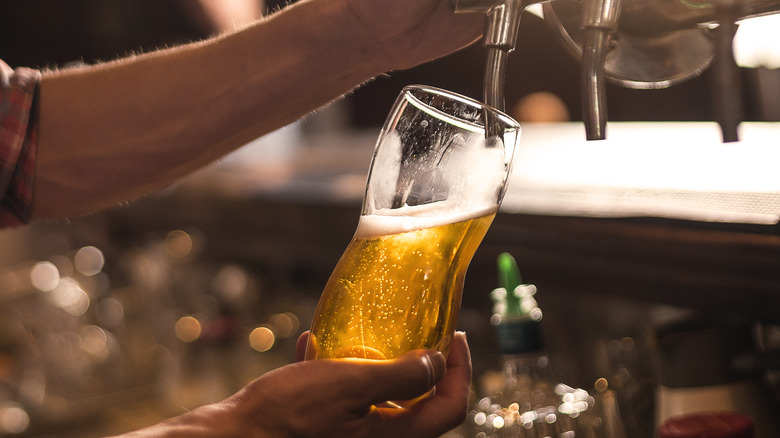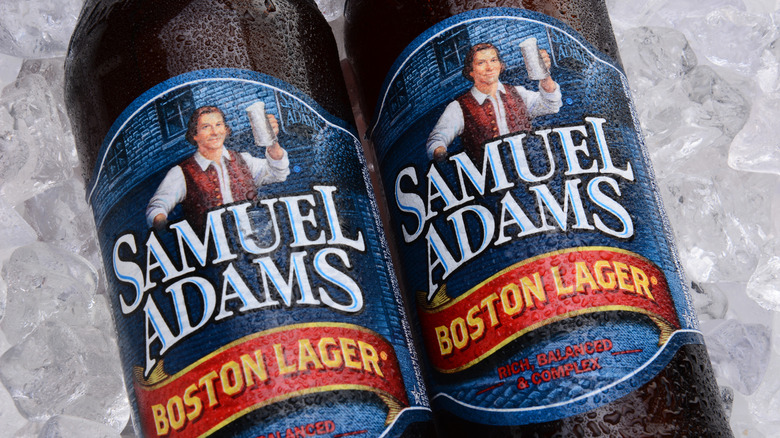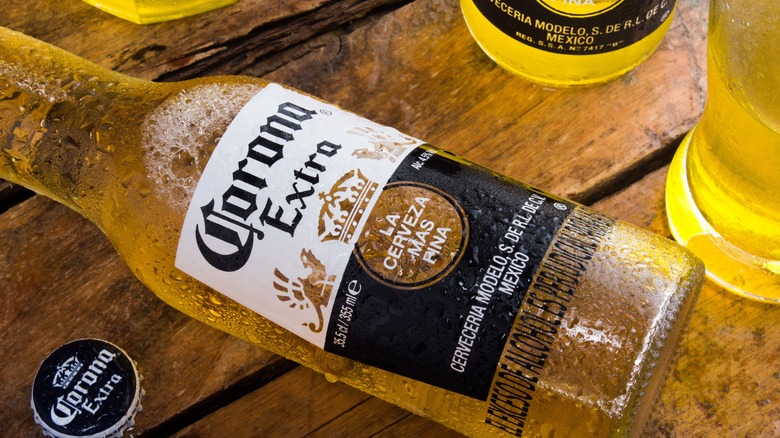What Does It Mean To Order A Domestic Beer?
Beer fans often know what brands will be listed on the domestic section of a drink menu before they even look at it. However, an inspection of what's on tap at many businesses makes some wonder what makes a beer truly "domestic." Staple brews you can find in most restaurants and bars across the country consistently elude the domestic menu, despite widespread availability. But just because a beer is widely available in a given country, that doesn't mean it's domestic.
Coors Light, Miller High Life, and Bud Light are all domestic American beers. These suds are brewed and intended for distribution within the United States. If widespread availability in the States was the primary factor in determining whether or not a cold one was domestic, then Guinness would be considered as such. However, Guinness is made in Ireland and intended for distribution all over the world. Thus, it's not a domestic American beer.
In America, many home-grown brands are known for their pilsners, but plenty of other types of beer also fall under the domestic umbrella. The type of beer has nothing to do with it being domestic. If it's brewed in the U.S. and that's where it's intended to be sold, it's considered a domestic brew.
Why domestic beers are sometimes more affordable
When you peruse a beer menu, domestic brews are often more affordable. This isn't because an establishment is incentivizing customers to buy American. This is actually because beers like Coors and Budweiser are brewed on a massive scale in large vats — and usually not too far away from the business you purchase it from. This method of brewing on a large scale, and keeping transportation minimal, lowers the overall cost for the brewery, the establishment buying beers from them, and customers. However, not all domestic beers will end up on the discount section of a beer menu.
Some slightly more expensive, craft beers are also considered domestic American brews. Sam Adams is an example of a craft brewery that makes some of these. In fact, the brand's flagship creation (the Boston Lager) is a German-style lager considered one of the products that helped pave the way for the American craft beer movement. However, because Sam Adams is a craft brewery, it produces its signature beer on a lower scale than some of its competition, and so its beer prices are slightly higher than those of other domestic beers.
Even though Sam Adams borrows inspiration for some of its varieties from overseas — like its JP Super Dry Lager, influenced by Japanese rice lagers – it's brewed primarily in Boston, Massachusetts, and mainly intended for sale within America. Thus, it fits the definition of a classic domestic beer.
Imported beers are domestic in their country of origin
Anheuser-Busch is well-known for supplying the nation with Budweiser. But outside the U.S., the company makes all kinds of beers that would be considered imports. Corona is one of these brews. It's not what kind of beer Corona is that keeps it from the domestic section of a menu — it's that Anheuser-Busch brews this beach-vibe beverage in Mexico. So, in Mexico, Corona is a domestic beer. Modelo is another example of a native Mexican brand.
Canada puts out several brewskis that are regularly enjoyed in the U.S., but they only qualify as domestic in Canada. Labatt Blue, Molson Canadian, and Sleeman would be beverages to look for in Canada if you wanted to try something indigenous. Becks is also a familiar brand in the U.S., but it's native to Germany, where it is produced. Krombacher and Warsteiner are also domestic beers in Deutschland.
Commonly seen on tap in many establishments in America and across the globe, Heineken is representative of an import anywhere but the Netherlands. While Heineken has brewing facilities in 70 countries worldwide, the iconic green bottles are filled with suds brewed primarily in Amsterdam. The beer may last longer in cans than bottles, but both containers are characterized as imports, and unfortunately, you won't see them on the discounted domestic beer menu here in the States.


